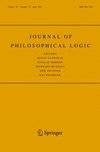A Dynamic Logic of Data-Informed Knowledge
IF 0.7
1区 哲学
0 PHILOSOPHY
引用次数: 0
Abstract
With agents relying more and more on information from central servers rather than their own sensors, knowledge becomes property not of a specific agent but of the data that the agents can access. The article proposes a dynamic logic of data-informed knowledge that describes an interplay between three modalities and one relation capturing the properties of this form of knowledge. The main technical results are the undefinability of two dynamic operators through each other, a sound and complete axiomatisation, and a model checking algorithm.
数据知识的动态逻辑
随着代理越来越依赖来自中央服务器而非自身传感器的信息,知识已不再是特定代理的属性,而是代理可以访问的数据的属性。文章提出了数据信息知识的动态逻辑,描述了三种模式和一种关系之间的相互作用,捕捉了这种知识形式的属性。主要的技术成果是两个动态算子相互之间的不可定义性、合理而完整的公理化以及模型检查算法。
本文章由计算机程序翻译,如有差异,请以英文原文为准。
求助全文
约1分钟内获得全文
求助全文
来源期刊

JOURNAL OF PHILOSOPHICAL LOGIC
PHILOSOPHY-
CiteScore
2.50
自引率
20.00%
发文量
43
期刊介绍:
The Journal of Philosophical Logic aims to provide a forum for work at the crossroads of philosophy and logic, old and new, with contributions ranging from conceptual to technical. Accordingly, the Journal invites papers in all of the traditional areas of philosophical logic, including but not limited to: various versions of modal, temporal, epistemic, and deontic logic; constructive logics; relevance and other sub-classical logics; many-valued logics; logics of conditionals; quantum logic; decision theory, inductive logic, logics of belief change, and formal epistemology; defeasible and nonmonotonic logics; formal philosophy of language; vagueness; and theories of truth and validity. In addition to publishing papers on philosophical logic in this familiar sense of the term, the Journal also invites papers on extensions of logic to new areas of application, and on the philosophical issues to which these give rise. The Journal places a special emphasis on the applications of philosophical logic in other disciplines, not only in mathematics and the natural sciences but also, for example, in computer science, artificial intelligence, cognitive science, linguistics, jurisprudence, and the social sciences, such as economics, sociology, and political science.
 求助内容:
求助内容: 应助结果提醒方式:
应助结果提醒方式:


